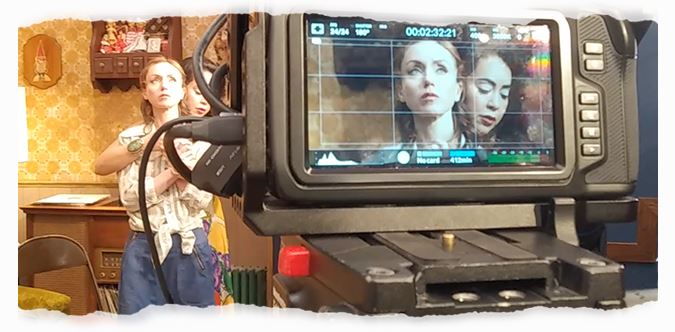How to Act Good – A Comprehensive Guide for Every Actor
Have you ever wondered how to act good? How do actors make us laugh, cry, and believe in their characters? It’s not just about memorizing lines and standing on stage. It’s about a complex interplay of skills, techniques, and dedication. This article will guide you through the essential elements of good acting, empowering you to unleash your inner performer and captivate your audience.
Table of Contents
What is good acting?
Good acting is creating a believable and captivating portrayal of another person. It involves the skillful use of voice, movement, and emotional expression to bring a character to life and connect with the audience on an emotional level. Good acting is not about simply memorizing lines and saying them on cue. It is about fully inhabiting the characters, understanding their motivations and desires, and expressing them in a way that is both truthful and compelling.
Read More: How to act in a movie – A Comprehensive Guide
Why is it essential to be a good actor?
Being a good actor can have many benefits, both personal and professional. It can:
- Develop your creativity and self-expression. Acting provides a unique opportunity to explore different emotions, personalities, and situations, which can help you expand your understanding of the world and yourself.
- Improve your communication skills. Acting requires clear, concise, and articulate verbal and nonverbal communication. These skills can be valuable in many aspects of life, from giving presentations to having difficult conversations.
- Boost your confidence and self-esteem. Stepping outside your comfort zone and performing in front of others can be a powerful way to build trust and self-esteem.
- Open doors to exciting opportunities. Good acting can lead to a fulfilling career in theatre, film, television, or other performance-related fields.
- Create meaningful connections with others. Acting can help you to connect with people on a deeper level, fostering empathy and understanding.
Who can benefit from this guide?
This guide is designed for anyone who wants to improve their acting skills, regardless of their experience level. Whether you are a complete beginner, a seasoned professional, or somewhere in between, you can always learn something to improve your craft. This guide provides a comprehensive overview of the critical skills and techniques essential for good acting and offers valuable resources and tips to help you.
How to act good? Let’s Explore Together
Here, we will explore how to act good. Let’s discuss some steps to understand better.
Step I. Foundational Skills
Developing a solid foundation in the essential skills of acting is crucial for anyone who wants to excel in their craft. These skills provide the building blocks for creating believable and captivating performances. By diligently practicing these foundational skills, aspiring actors lay the groundwork for success in their artistic endeavors. With continued dedication and refinement, these skills will become second nature, allowing actors to fully immerse themselves in the characters they portray and deliver truly memorable performances.
1. Voice and Speech
- Vocal clarity and projection: Your voice must be clear and audible to the entire audience, even in large spaces.
- Breathing exercises and vocal warm-ups: Regular practice helps develop vocal control, stamina, and flexibility.
- Articulation and pronunciation: Pronounce words clearly and distinctly, paying attention to proper pronunciation and dialect variations if needed.
- Working with different accents and dialects: Mastering various accents and dialects expands your acting range and allows you to portray characters from diverse backgrounds.
- Maintaining vocal energy and variety: Use vocal variety to convey emotions and keep the audience engaged.
Read More:
2. Movement and Physicality
- Body awareness and alignment: Understanding your body and its movement patterns helps you express yourself physically with confidence and control.
- Stage presence and movement in space: Utilize the stage effectively, using purposeful activity to enhance your performance and connect with the audience.
- Nonverbal communication: Communicate effectively through body language and facial expressions, conveying emotions and subtext without words.
- Physical characterization and stage combat: Develop physical mannerisms and gestures that reflect your character’s personality, and learn basic stage combat techniques if required.
3. Emotional Expression
- Understanding and accessing different emotions: Explore and understand a wide range of human emotions, both positive and negative.
- Authentic emotional responses to stimuli: React authentically to your character’s events and situations, demonstrating genuine emotional reactions.
- Subtext and conveying hidden emotions: Go beyond the surface level and share unspoken feelings and intentions through your performance.
- Using physicality and voice to express emotions: Combine vocal and physical techniques to effectively describe your character’s emotional state.
Step II. Character Development
One of the main steps in “how to act good” is character development. Bringing a character to life is memory more than singing and reciting lines on stage. It’s about understanding the character’s motivations, desires, and experiences and using that knowledge to inform your performance. This process of character development requires thorough analysis of the script, exploration of the character’s backstory, and building believable relationships with other characters.
1. Analyzing the Script
- Understand the play and your character’s role. Please read the play carefully and analyze its structure, themes, and genre. Identify your character’s place within the story and their contribution to the overall narrative.
- Identify your character’s wants, needs, and motivations. What does your character desire? What are their deepest needs? What motivates them to take action? Understanding these elements is crucial for portraying a believable and compelling character.
- Explore your character’s backstory and relationships. Consider your character’s past experiences and how they have shaped them into who they are now. Analyze their relationships with other characters in the play, understanding their dynamics and how they influence your character’s behavior.
- Find your character’s unique voice and mannerisms. How does your character speak? What are their physical mannerisms? How do they react to different situations? Developing these fantastic characteristics will help your character stand out and become memorable.
Read More: Top 10 Voice Acting Tips for Beginners
2. Creating a Backstory
- Fill in the gaps in your character’s history. Go beyond what is explicitly stated in the script and develop a more detailed backstory for your character. This could include their childhood, education, relationships, and significant life events.
- They are developing their relationships and experiences. Explore your character’s relationships with family, friends, and other individuals in their life. Imagine their past experiences and how they have impacted their personality and worldview.
- They understand how their past shapes their present. Analyze how your character’s past has shaped their present behaviors, motivations, and decisions. This will help you connect to the characters more deeply and portray them authentically.
- You are using your backstory to inform your performance. Draw upon your character’s backstory to inform your choices and reactions throughout the play. Let their past experiences guide their emotions, actions, and interactions with other characters.
3. Building Relationships
- You are connecting with your fellow actors. Building genuine connections with fellow actors is essential for establishing believable and dynamic relationships on stage. This involves active listening, empathy, and a willingness to collaborate.
- You are establishing believable and dynamic relationships. Analyze the connections between your character and other characters in the play. Understand the nature of each relationship, whether it is love, hate, friendship, or rivalry.
- They are responding authentically to their emotions and actions. Be present in the moment and respond authentically to the feelings and actions of other characters on stage. This will create a sense of realism and draw the audience into the world of the play.
By dedicating time and effort to this crucial step, actors can create complex, relatable, and engaging characters for the audience. A well-developed character forms the foundation of a powerful performance, allowing the actor to connect with the audience on an emotional level and leave a lasting impression.
Step III. Script Analysis and Interpretation
A thorough understanding of the script and its underlying meaning is essential for delivering a genuinely impactful performance. Script analysis and interpretation go beyond memorizing lines and involve dissecting the play’s structure, themes, and subtext to uncover its hidden messages and intentions. By engaging in this in-depth analysis and interpretation, actors gain a deeper understanding of the script and unlock its hidden layers of meaning. This empowers them to deliver performances that are not only technically proficient but also emotionally resonant and intellectually stimulating for the audience.
Read More: VISUAL STORYTELLING TECHNIQUES IN FILM
1. Understanding the Play’s Genre and Style
- You are identifying the conventions of the genre. Recognize the patterns and expectations associated with the play’s genre, such as comedy, drama, tragedy, or farce. This knowledge helps you tailor your performance to fit the style of the play.
- They are analyzing the play’s structure and themes. Explore the play’s design, including its exposition, rising action, climax, falling action, and resolution. Identify the central themes explored in the play and how they are woven into the narrative.
- It is interpreting the playwright’s intentions. Consider the playwright’s background, influences, and possible motivations for writing the play. This can offer valuable insights into the play’s message and subtext.
2. Breaking Down the Script
- We are identifying key scenes and monologues. Pay close attention to critical scenes and monologues that reveal crucial information about your character and the play’s plot. Analyze these sections in detail to understand their significance and impact.
- It is understanding the subtext and underlying meaning. Look beyond the surface level of the script and explore the subtext, or unspoken meaning and emotions, present in the dialogue and actions. This helps you convey the proper depth and complexity of the play.
- You are marking your script with notes and annotations. Make notes and annotations directly on your hand to highlight essential plot points, character motivations, emotional shifts, and anything else that stands out to you. This can serve as a valuable reference point during rehearsals and performances.
3. Finding the Play’s Message
- What is the playwright trying to say? Reflect on the play’s themes and subtext to understand the playwright’s message or “big idea.” What are they trying to communicate to the audience?
- How can your performance convey that message? Consider how your portrayal of your character can contribute to getting the play’s message. Analyze how your character’s actions, words, and emotions contribute to the narrative and message.
Step IV. Rehearsals and Performance
The journey from script to stage culminates in the crucial step of rehearsals and performance. This is where actors combine character development, script analysis, and foundational skills to create a unified and impactful version. By consistently practicing, maintaining focus, and collaborating effectively with others, actors transform rehearsals into a space for exploration, growth, and refinement. This dedicated preparation ultimately leads to confident and impactful performances that captivate the audience and leave a lasting impression.
Read More: How to Get Better at Acting and Conquer Every Stage
1. Taking Direction
- Actively listen to feedback and suggestions. Be receptive to feedback from the director and other actors, recognizing it as an opportunity for growth and improvement.
- Integrate feedback into your performance. Incorporate the feedback into your routine, experimenting with different approaches and refining your choices.
- Maintain a positive and collaborative attitude. Remember that rehearsals are a collaborative process. Be open to feedback, communicate effectively, and collaborate to create the best possible performance.
2. Stage Blocking and Movement
- Learn and execute stage blocking effectively. Pay close attention to the stage blocking, understanding your movement patterns and relationships with other actors on stage.
- Use movement to enhance your performance. Utilize purposeful activity to improve your characterization, convey emotions, and connect with the audience.
- You are connecting your physicality to your character’s emotions. Let your physicality reflect your character’s emotional state. Use gestures, facial expressions, and posture to communicate your character’s inner world.
3. Staying Focused and Present
- They are overcoming stage fright and performance anxiety. Develop strategies to manage stage fright and performance anxiety, such as relaxation techniques, visualization exercises, and positive self-talk.
- You are maintaining focus and concentration throughout the performance. Remain fully present in the moment throughout the performance, focusing on your character’s actions and emotions.
- I responded to unexpected situations and improvised. Be prepared to respond to unforeseen problems and adapt to changes on stage. Learn to improvise when necessary while staying true to your character and the play.
4. Collaborating with Others
- We are building a solid ensemble. Work effectively with your fellow actors to create a cohesive and believable ensemble.
- Supporting your fellow actors: Be supportive of your fellow actors, both on and off stage. Listen to their needs, provide constructive feedback, and celebrate their successes.
- You are communicating effectively with the director. Maintain clear and open communication with the director throughout the rehearsal process. Share your ideas, ask questions, and seek clarification when needed.
Step V. Additional Resources
Expanding your knowledge and skills as an actor requires continued learning and exploration. By actively seeking out additional resources and immersing yourself in the world of acting, you can continue to develop your skills, refine your craft, and increase your confidence as an actor. Here are some additional resources to support your artistic journey:
1. Acting Classes and Workshops
- Enroll in acting classes: Participating in acting classes provides a structured learning environment to develop your skills under the guidance of experienced instructors.
- Attend workshops: Workshops offer focused learning opportunities on specific aspects of acting, such as voice and speech, movement, auditioning, or character development.
- Seek individual coaching: Consider working with an acting coach for personalized feedback and guidance tailored to your needs and goals.
2. Books and Articles on Acting Technique
- Read books and articles written by renowned acting teachers and directors. These resources offer valuable insights into different acting methodologies and approaches.
- Browse online databases and journals related to acting. Many websites and publications provide articles, interviews, and other resources for actors of all levels.
- Subscribe to acting magazines and newsletters. Stay informed about current trends in the industry and discover new resources and opportunities.
Read more: Acting Tips for film: Every Actor Needs to Know
3. Online Resources and Tutorials
- Utilize online platforms offering acting tutorials and video demonstrations. These resources can provide visual examples and practical exercises to enhance your learning.
- Join online communities and forums for actors. Connect with fellow actors, share experiences, ask questions, and receive feedback from like-minded individuals.
- Explore educational websites and apps designed for actors. These interactive resources offer personalized learning modules and practice tools.
4. Observing Professional Actors and Performances
- Attend live theatre productions and film screenings. Observing professional actors in action provides valuable insights into character portrayal, stage presence, and technical skills.
- Analyze performances and discuss your observations with other actors. Reflect on the strengths and weaknesses of each performance and identify areas for your development.
- Watch documentaries and interviews with successful actors. Learn about their experiences, challenges, and strategies for success in the industry.
5. Participating in Productions
- Audition for local theatre productions, student films, and other performance opportunities. Gain practical experience performing in front of an audience and receive valuable feedback from directors and audiences.
- Participate in theatre festivals and competitions. These events provide opportunities to showcase your skills, network with other professionals, and gain exposure in the industry.
- Consider volunteering in community theatre productions. This allows you to contribute to the arts and gain valuable experience in a supportive environment.
Step VI. How to act reasonable “conclusion”
This comprehensive guide has provided an overview of the essential elements contributing to good acting. From foundational skills like voice and movement to advanced techniques like script analysis and character development, this resource equips aspiring actors with the knowledge and tools necessary to embark on their artistic journey.
Remember, becoming a good actor is a continuous learning, practice, and self-discovery process. Embrace challenges, seek feedback, and never stop exploring your creative potential. By dedicating yourself to your craft and remaining passionate about acting, you can unlock your full potential and achieve your artistic aspirations.
This guide is just the beginning. Continue to explore, experiment, and grow as an actor. The world awaits your talent and unique perspective. Take the stage, tell stories, and share your passion with the world.
How to Act Good-Frequently Asked Questions.
Are you curious about the acting world and what it takes to succeed? Here are answers to some of the most frequently asked questions aspiring actors have:
What skills are essential for good acting?
Essential skills include clear voice and speech, expressive movement, authentic emotional expression, script and character analysis, character development, and collaboration. These skills and artistic expression form the foundation for captivating performances.
What are the different acting methods?
Popular methods include Method acting, the Meisner technique, the Stanislavski system, Brechtian acting, and the Suzuki Method. Each plan offers a unique character development and performance approach, emphasizing aspects like emotional recall, living truthfully in the moment, realistic portrayal, audience awareness, and physical expression.
How can I gain experience as an actor?
Actively seek opportunities by auditioning for plays, films, and productions, enrolling in acting classes and workshops, participating in community theatre, creating projects, and networking with other actors and industry professionals.
What are some common challenges aspiring actors face?
Finding auditions, dealing with rejection, managing stage fright, balancing acting with other commitments, and building a career in a competitive industry are some common hurdles aspiring actors encounter.
What tips should aspiring actors keep in mind?
Passion, dedication, and persistence are essential. Develop your skills through training and practice, proactively seek opportunities, learn from mistakes, build relationships, prioritize your well-being, and believe in yourself and your talent. The journey to success in acting takes time and effort, but with the right attitude and approach, you can achieve your artistic aspirations.


![Top Ten Acting Tips [2024]-Acting Excellent 2 Top Ten Acting Tips [2024]-Acting Excellent](https://actingexcellent.com/wp-content/uploads/2021/02/pexels-photo-4061506.jpeg)





2 Comments